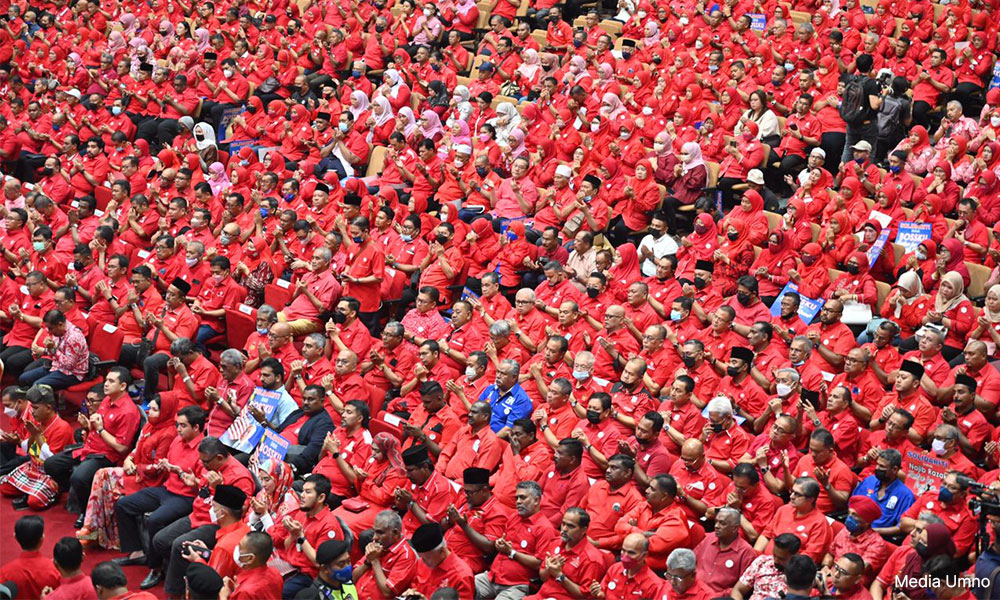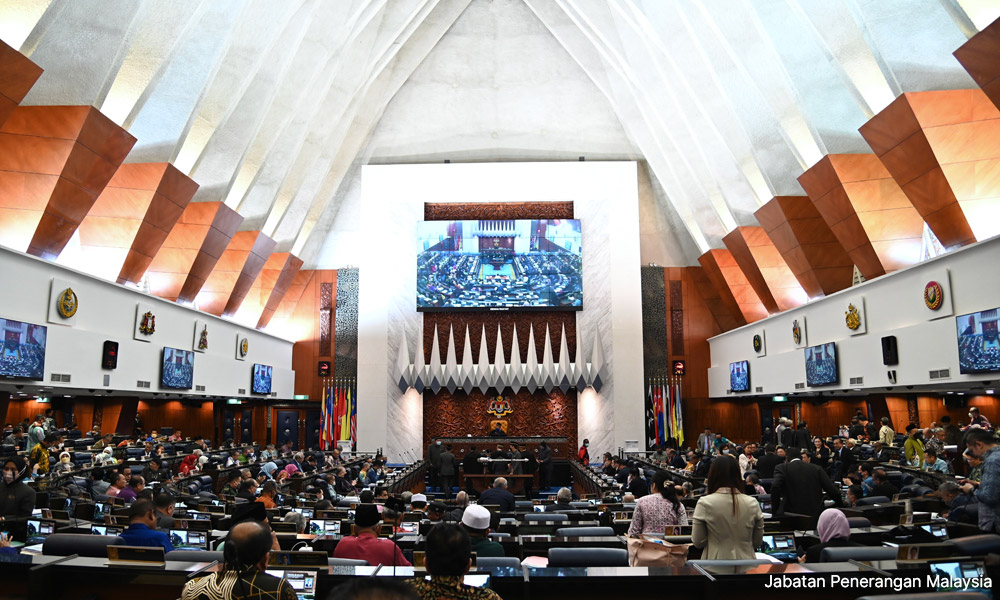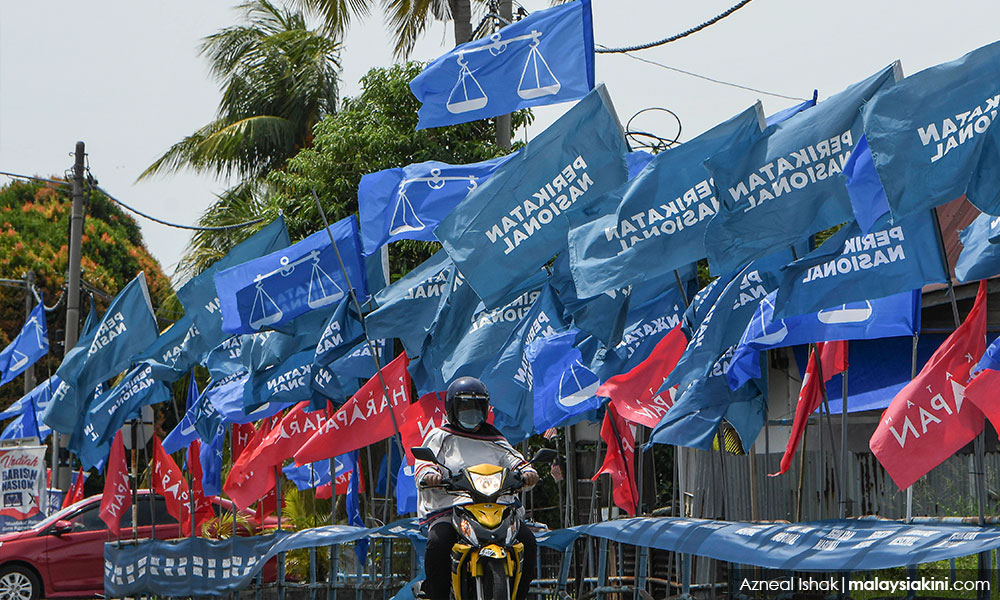What are the options left for Umno for now till GE16 after its humiliating defeat, worse than in GE14?
Some Umno leaders have called for the party to stay out of government as opposition. Whatever decisions are made today or this week, they must be revisited in the Umno party election, latest by April 19, 2023, or before or after the state elections in the six states – three each under PN and Pakatan Harapan – expected by or before next August.
Whether multiparty democracy can grow healthily may partly depend on how Umno reinvents itself or allow itself to be gradually swallowed by other parties. In this election, BN won the support of 3.4 million votes or 22.20 percent and like it or not, a brand name for Malay-Muslim nationalist/conservative voters.
Umno’s choices can be split into two levels. First, should it join a coalition government or stay out as an opposition bloc on a Confidence and Supply Agreement (CSA) with the coalition government? Second, whether as a government junior partner or an opposition on CSA, should it side Harapan or PN?
What are the payoffs in these options?
Junior partner in coalition government
The best advantage of joining the next coalition government even as a junior party is of course incumbent advantages, from influencing government policies and law-making to enjoying allocations and resources exclusively accessible for government lawmakers.

The disadvantage? As a junior partner in the coalition government, it may lose its identity and credibility in the next election. The senior partner tends to get credit for a coalition government’s success while the junior partners often have a tough time pleasing their own supporters for achieving too little.
In the worst cases like the UK Liberal Democrats (Lib-Dem), they may lose much of their support after joining a coalition government.
Lib-Dem won 46-62 seats for three consecutive elections before 2010. In 2010, when the UK had the first hung Parliament in nearly four decades, Lib-Dem which won 57 seats formed a coalition government with the Conservatives as the junior partner.
It could win only eight seats in the 2015 election when the coalition government finished its term, and 12 and 11 seats subsequently in 2017 and 2019.
Umno would clearly remember its embarrassment in mid-2021 when it slammed the Muhyiddin Yassin government as a “failed government” when a quarter of ministers were from UMNO.
Opposition with CSA?
The greatest advantage of being in opposition is maximum product differentiation from the government parties, so that voters dissatisfied with the government may see them as a clear alternative.
The cost? Up until 2020-1, being on the opposition bench means inefficacy in both influencing policy-making and law-making and bringing allocations back to the constituency. This in turn results in opposition lawmakers who take radical positions for product differentiation’s sake.

This changed with the emergence of CSAs as a tool for government-opposition collaboration in hung parliaments.
The opposition is free to criticise the government and vote down all government bills and motions as long as they don’t vote against the government on confidence and budget (called supply bills). In return, the government promises policy concessions and institutional reforms.
The first CSA emerged in Perak in December 2020 between the new Umno-led government and Harapan after the two blocs secretly collaborated to oust Bersatu menteri besar Ahmad Faizal Azumu. All lawmakers regardless of party affiliation were given equal allocation and seats in district-level policy committees.
With the MOU on Political Transformation and Stability (essentially a CSA) signed between the Ismail Sabri Yaakob government and Harapan in September 2021, not only all the 90 Harapan parliamentarians enjoyed the same allocation with government MPs, both the opposition lawmakers and government backbenchers too have more influences in lawmaking and policymaking with parliamentary reform.
What Umno may get from a CSA depends on what it demands and what Harapan or PN is willing to give.
The CSA may even cover decentralisation and hence involve Umno state governments in Johor, Malacca and, if Umno forms government with Harapan as a junior partner or on CSA, Pahang. This would allow Umno to shine in state administration and build back its glory.
PN or Harapan?
Whether as a junior partner in a coalition government or a CSA opposition, should Umno choose between Harapan or PN?
This would depend on how Umno (with 26 seats) want to position itself amongst Malay-led parties in the peninsula and Sabah: PAS (44 seats), Bersatu (32 including the four won under GRS), PKR (31) and Amanah (8).

The first option is the Sabah Umno-GRS model, where the two blocs divided the constituencies amongst themselves to fend off their contender with a comparable BN-origin and social base, Warisan.
If Umno can accept a demarcation of territories with PAS and Bersatu, especially to withdraw from the four northern states, and just aim to compete with PKR and Amanah, then joining PN as its junior partner would be the most rational decision.
Umno can still be a powerful regional party of the South and the East, based in Johor, Malacca, Negeri Sembilan and Sabah, and projecting its strength to other states. Its maximum strength may be kept at around 44 seats namely 26 seats currently won, plus 18 seats it lost to PKR and Amanah.
However, if Umno has a greater ambition to come back as a national party, at least to wrest back 17 and 10 seats it lost to Bersatu and PAS this round, then it would make more sense for Umno to be either a CSA opposition supporting Harapan, or next, a junior partner in a Harapan-led government.
Permanent coalitions in Malaysia have not developed a good mechanism for two ambitious parties with overlapping territories to co-exist and compete dynamically. PAS’ cohabitation with Umno as its junior partner in BN (1974-1977) ended with PAS losing Kelantan.
A similar fate may befall Umno if it becomes a junior partner to PAS and Bersatu. Alternatively, it may be absorbed by Bersatu, attaining the goal of Dr Mahathir Mohamad during the Harapan rule.
Why should Malaysians care?
Many Malaysians, especially those who vote for Harapan and PN, may not care how Umno may evolve and re-invent. For them, Umno represents all things that have gone wrong: corruption, power abuse, too much Malay supremacy (for Harapan supporters) and too little of Muslim supremacy (for PN supporters).
However, if we want to see democracy work in Malaysia, we need Umno to compete rigorously to offer sound policies (even though some we may not agree with), instead of striking transactional deals to survive on new patronage arrangements. - Mkini
WONG CHIN HUAT is an Essex-trained political scientist at Sunway University working on political institutions and group conflicts. Mindful of humans’ self-interest motivation while pursuing a better world, he is a principled opportunist.
The views expressed here are those of the author/contributor and do not necessarily represent the views of MMKtT.




No comments:
Post a Comment
Note: Only a member of this blog may post a comment.